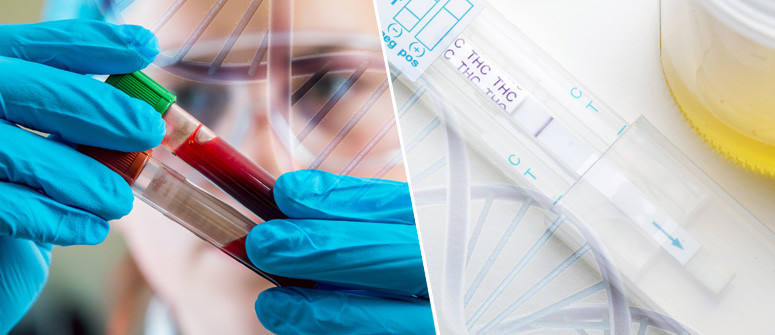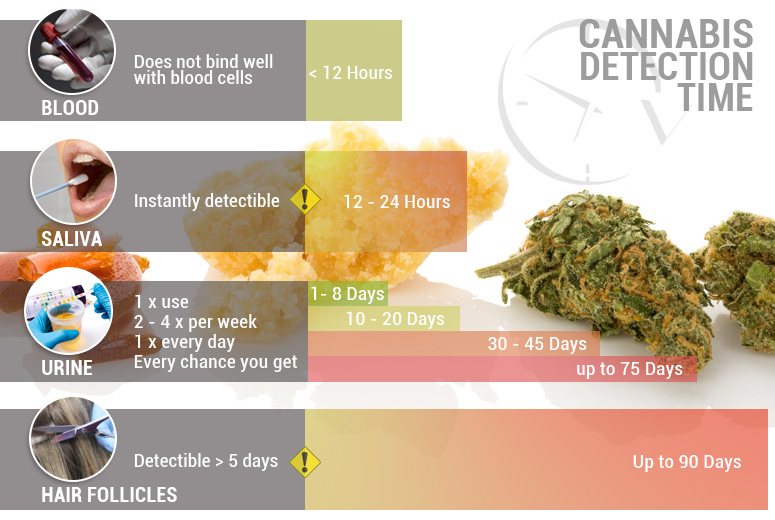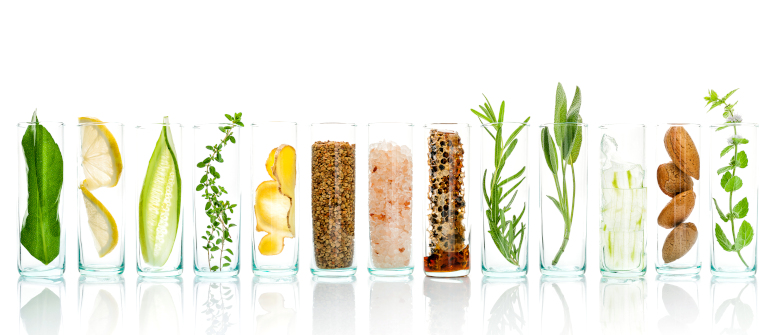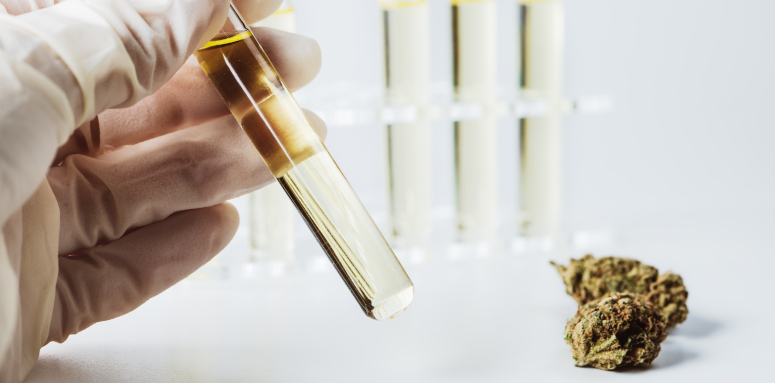How to pass a marijuana drug test

Have a drug test coming up? Don't be caught out by a positive result. Use our tips instead! In this article, we'll provide you with some advice on eliminating THC metabolites from your body before a marijuana drug screening.
Contents:
Even with marijuana legalization passing in pockets across the world, cannabis is still frowned upon by society as a whole. As such, many companies still require applicants and/or employees to undergo mandatory drug tests.
For any cannabis lover, this could pose a hindrance. But, there are ways to get around these hurdles if you do things the right way.
Now, just to be clear, this article isn’t about gaming the system to get your desired result. Rather, it’s more about getting rid of those unwanted THC metabolites as efficiently as possible.
If we’ve piqued your interest enough, be sure to read through to the end. We’ll provide you with the vital information you came here for.
How Does Weed Affect My Body?

Now, before we get into the meat of the topic, let’s first go deeper into how weed is processed in the body.
The high you get from smoking or ingesting cannabis comes from THC (aka tetrahydrocannabinol), the plant’s chief psychotropic component. Regardless of intake method, the THC is absorbed by fatty tissues and organs until it’s ultimately metabolised by the liver.
Here’s where it can get problematic. As time passes, all that THC stored within the fatty tissues gets released back into the bloodstream.
For heavy, chronic users, THC tends to build up a lot quicker than it can be eradicated. It’s why even if you decide to stop, there still might be a possibility of a positive test result days after.
But, interestingly, it’s not usually THC itself that is responsible for individuals testing positive for marijuana; it’s actually THC’s metabolites, which, as you might imagine, can remain in the body for much longer.
How Long Is THC Detectable?
The amount of time in which THC and its metabolites remain in your system depends on several factors. Some of these are genetic while others are based on lifestyle choices and drug test methods:
• Metabolism and body mass
• Dosage and frequency of use
• Genetics and sex
• Type and sensitivity of drug test
Metabolism and Body Mass
In the previous section, we briefly discussed how THC gets stored in the body. Since it’s fat-soluble, it builds up within fatty tissues in particular.
Simply put, the more body fat you have, the greater chance you'll hold THC in your system.
With that said, one may think that exercising right before the test would help eliminate the traces. However, research shows the exact opposite effect.
As a 2013 study shows, working out may actually cause a temporary spike in blood THC levels. The explanation is that exercising enables the release of dormant THC that’s been stored in fat. As such, it’s not recommended to work out directly before your drug screening, but rather in the weeks before the test (if you’re given adequate time to prepare).
Dosage and Frequency of Use
This is an obvious one, and likely the biggest factor. The more cannabis you consume regularly, the more THC piles up in your body.
The method of consumption may also play a factor in the length of time THC metabolites stay in your system. Edibles are said to remain in the body longer compared to smokables.
According to one study, THC’s metabolites could linger inside of you for a period of 90 days. If you’re a chronic, habitual smoker, allow yourself a longer lead time before you undergo a drug test, if possible.
Genetics and Sex
Compared to men, women statistically have a higher proportion of body fat. Their bodies are also more efficient in fat storage, particularly during periods when they’re not active or exercising. That’s just how genetics tends to work for us humans.
That difference in body fat plays a role in cannabis’ effect on women. According to one study, females may experience weaker effects because more THC gets retained in fat cells.
But, because of that higher percentage of body fat, women may also store THC for a longer period—another thing to consider if you have a prospective drug test on your radar.
Type and Sensitivity of Drug Test
There are four main drug testing methods used to determine THC levels in the body: hair, saliva, urine, and blood.
Each method differs in its ability to detect THC or its metabolites, and the more sensitive procedures are able to detect even smaller traces of the psychotropic cannabinoid. This, of course, will impact how long you should abstain from THC before your drug screening.
Type of Marijuana Drug Tests and Detection Times

Now, let’s take a deeper look at each type of marijuana drug test and its associated detection time.
Urine Test
Urine testing is by far the most widely used method, especially in terms of workplace testing. It’s because all metabolic substances are excreted from the body in this manner.
The standard sensitivity cutoff for tetrahydrocannabinol in a urine test is 50ng/ml.
Detection Time
The amount of THC metabolites that are detectable in a urine sample will depend on the amount of cannabis consumed and the frequency of use.
In general, here’s how long THC remains in urine, depending on how often the person partakes:
• One to three times per week: 3 days
• Four times per week: up to 7 days
• Daily user: 10–15 days
• Heavy user (multiple times per day): 30 days or more
Saliva Test
Another common drug-testing method that companies opt for is saliva, or "oral fluid", screening. With its less-invasive nature compared to urine tests, it’s a procedure that many applicants prefer.
However, there is one caveat: saliva tests can only detect recent substance use. Specifically, some of these tests may render an accurate reading within four to ten hours of consumption, but that’s about it.
Detection Time
As one study notes, the detection time for oral fluid tests could be prolonged for chronic and heavy users. But, to give you a better idea, here’s a rough breakdown:
• Occasional users: up to 3 days
• Heavy users: up to 29 days
Blood Test
Unlike the aforementioned two tests, blood testing is one of the least sought-after screening methods. Not only is it more costly, but the process itself is invasive.
The upside, however, is that blood tests provide comprehensive results. One test can determine the actual presence of THC, not just its metabolites.
Detection Time
When it comes to detection time for blood tests, the window is a bit similar compared to saliva tests:
• Occasional users: up to 2 days
• Heavy users: 29 days or more
Hair Test
THC has the ability to reach the hair follicles through the blood vessels, hence the existence of cannabis hair tests.
What makes it a choice method for evaluators is that residues may remain even months after consuming cannabis. That’s regardless of the individual’s shampoo regimen. The only downside is that it cannot provide a measure of someone’s recent substance use.
Detection Time
Whether you’re a chronic or occasional user, hair tests can detect traces of THC up to 90 days after consumption.
These tests usually require samples from near the crown. These hairs may show three months' worth of cannabis use.
How To Get THC Out of Your Body
Now, let’s get to the topic you came here for. Below are our top suggestions for eradicating THC from your body and ultimately passing your drug test.
It’s worth noting that certain methods are only appropriate for specific testing procedures, and may not work for others.
Stop Using Cannabis
This one’s a no-brainer. Reducing your marijuana intake will limit the THC content in your system, at least during the pre-drug test time frame.
But here’s a word of caution: quitting marijuana cold turkey isn’t the best option. For chronic users in particular, you’d be on a freight train headed straight for withdrawal symptoms.
So, what’s your best recourse? Taper off your weed usage. Gradually reduce your consumption day by day until you get to zero. That way, it won’t be such a shock to your system. Of course, this method is most successful when the drug test is somewhat far down the line.
Drink a Lot of Water
Here’s one of the THC-eradicating methods that may only work for one testing procedure; in this case, urine tests.
Chugging loads of water before your test may work like a charm. It helps flush out toxins, including THC, so, if you do it right, it might just save you from a positive result.
However, overdoing it may also get you into trouble, as you may end up handing in an overly diluted sample. Yes, they will make you re-test.
Detox Drinks and Kits

If you find water to be too bland and boring, detox drinks are your next best option. You take these drinks on the day of your marijuana drug test and just let them work their magic.
What’s great about detox drinks is that they spearhead your body’s detoxification process naturally. Not only are you ridding yourself of unwanted THC metabolites, but other toxins as well.
The danger of these drinks, however, is that they may take out the essential indicators that urine tests are looking for. That’s when you resort to detox capsules, which act just to take away the traceable amounts of THC.
Try Zinc
Zinc supplements are mainly for boosting the immune system and metabolic function, but they can also help you out with your marijuana drug tests.
As a 2011 study notes, both zinc sulfate and zinc supplements can interfere with the detection of all substances sought after in drug-testing kits. That, of course, includes THC.
Just like with water loading, be careful not to take too much of these supplements.
What About Synthetic Urine?
When people have their backs against the wall, some resort to extreme measures. It’s how synthetic urine for drug tests came about.
So, what exactly is synthetic urine? It’s a substance generally composed of salt, creatinine, uric acid, and yellow colouring to mimic one’s liquid excrement. And, in some cases, it works like a charm.
Now, any sensible individual will see through the absurdity of this situation. Urine testers are aware of this scheme, and there’s a good chance for you to get caught. Save yourself from all that trouble.
What About Shampoos?
There are “specialised” shampoos on the market that claim to be the solution to hair follicle drug tests. But here’s an important tidbit to keep in mind: hair tests don’t examine the exterior part of the follicle.
Rather, they probe beneath the hair’s exterior casing. It’s in this inner region where blood metabolites are found, including possible THC metabolites.
For the sake of answering this question, allow us to reiterate what was stated in the hair test section of this article: no amount of shampooing will help you render a negative test.
If you’re getting yourself ready for a follicle test, your best option would be to shave every hair on your body. But, do you want to live with that for the sake of trying to beat the test?
Recap: How To Pass a THC Drug Test

We’d like to remind you, dear readers, that this isn’t about gaming the system; it’s more about taking proper measures to lower systemic THC levels before you send in that specimen sample.
There is no foolproof way to fully eradicate THC from your body, but the methods above may help you out. Here’s a recap:
• Drinking a significant amount of water may help flush out excess THC metabolites from your system. Detox drinks/supplements and zinc could work as well. Just don’t overdo them.
• Shampoos will do nothing to prevent a positive hair follicle test result. In the same manner, using synthetic urine may draw suspicion on you. These methods aren’t worth your time.
• The best way to pass a drug test is to abstain from cannabis consumption. Unless you’re subjected to a random test, give yourself enough lead time.
And, for CBD users, you need not worry about these tests because cannabidiol isn’t among the tested substances. However, there are some uncommon exceptions to this rule.
Hopefully, this article was able to answer any questions you had regarding THC and marijuana drug tests. The most important thing to keep in mind: always exercise caution.
.jpg)
.jpg)

.jpg)
